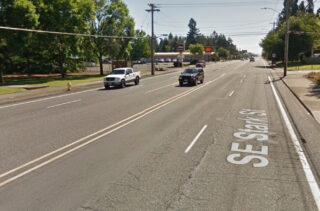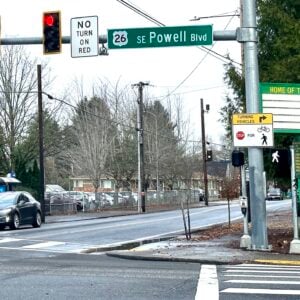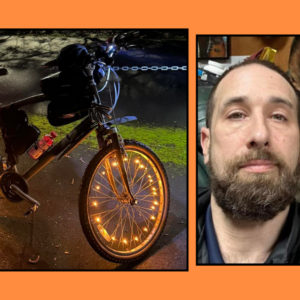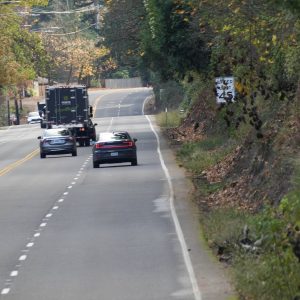
A 23-year-old Portland resident has been arrested due to his role in the death of a bicycle rider on Sunday evening.
Gresham Police have charged Kurtis Linn with DUII, Reckless Driving and Manslaughter in the 2nd degree. According to The Oregonian, Linn was driving his Chevy Blazer at nearly twice the speed limit and after consuming two drinks at a local bar prior to the collision.
Linn says he was racing another auto user and lost control of his car, then slammed into another car before he struck and killed Albert Sawdon who was bicycling in the bike lane.
Advertisement
The collision occurred near the intersection of SE Stark and 212th Ave.
Here’s more from The O:
Kurtis Linn told Gresham police officers from an OHSU Hospital bed that he challenged the driver of a Honda Civic to a race along Southeast Stark Street, hit his brakes and steered his Chevy Blazer away when he thought the Honda was going to hit him and crashed, a probable cause affidavit said….
Another driver told investigators he saw Linn’s Chevy and the Honda Civic speeding around 55-60 mph behind him while heading west on Southeast Stark Street and swerving around other cars, the affidavit said. The witness said the Chevy went into oncoming traffic, hit a Ford Escape, spun around and hit Sawdon on his bike.
The Gresham PD is still investigation the collision. If you saw anything, please call them at (503) 618-2719.
— Jonathan Maus: (503) 706-8804, @jonathan_maus on Twitter and jonathan@bikeportland.org
Never miss a story. Sign-up for the daily BP Headlines email.
BikePortland needs your support.







Thanks for reading.
BikePortland has served this community with independent community journalism since 2005. We rely on subscriptions from readers like you to survive. Your financial support is vital in keeping this valuable resource alive and well.
Please subscribe today to strengthen and expand our work.
If this isn’t grounds for permanently revoking his license, nothing is. Sadly, I assume he’ll be back on the road in short order.
I looked this up. If it is the third DUII offense, and the third takes place within 10 years of the first two, then the license will be permanently revoked. Strangely, vehicular manslaughter comes with a heftier sentence and fine, but does not appear to have a license revocation aspect.
Reckless driving is similar to DUII- first offense 90 day suspension of license. If, within 5 years, you have another conviction, 1 year suspension. A third in 5 years? 3 year suspension. So the most I’d expect from this particular case is a 90 day license suspension. I’m not sure if that is applied concurrently if you serve jail time.
You forgot the freebie DUII that Oregon allows. The first conviction in each decade can be washed away with a diversion. Therefore, it isn’t until the fourth DUII conviction that a chronic drunk driver is eligible for license revocation.
Worse yet, the little suspensions along the way aren’t actual bans on driving since hardship waivers to drive to work and shopping are automatic. (I was going shopping; there’s a store on the coast that has something I need.)
Our coddling of irresponsible drivers is truly deadly. I honestly don’t know how our legislators sleep at night.
Yes, but not all DUII’s are equal. I know someone who received a DUII because he walked out of a bar drunk and fell asleep in the BACK SEAT of the car in the parking lot. The DUII stemmed from the fact that he turned the car on in order to stay warm. Police said that while they did not observe him driving, he may have driven there and hence the DUII.
Apparently, there are a lot of circumstances for which DUII applies that have nothing to do with actually driving. I’m not sure why the law was written this way but it could explain the lenient first conviction sentences.
I am all for permanently revoking DL’s for any at fault fatalities and think that cases like Aaron Schrantz who killed Mitch York on the St. John’s Bridge and now this Favian Garcia killer are far too common. However, I don’t know what the best remedy would be for people who routinely flaunt their DL suspensions as was the case w Schrantz.
“I know someone who received a DUII because he walked out of a bar drunk and fell asleep in the BACK SEAT of the car in the parking lot. The DUII stemmed from the fact that he turned the car on in order to stay warm.”
Hmm, how common is that?
“I honestly don’t know how our legislators sleep at night.”
Those pillows paid for by the API and auto and insurance lobbies are quite comfy.
I hope it’s multiple grounds for throwing him in jail for a long time and then taking away his license permanently
Selfish loser.
In a way, I’m glad he was drunk. At least that means they’ll prosecute.
Exactly right. It’s clear there are actually penalties for killing someone if you’re drunk.
Kurtis claimed he had two drinks, but he was still over the legal limit 17 hours later.
“I had 2-3 beers” is the common response drunk drivers give when police ask them how much they’ve had to drink. Or maybe he had two double Long Island ice teas…
“According to The Oregonian, Linn was driving his Chevy Blazer at nearly twice the speed limit and after consuming two drinks at a local bar prior to the collision.”
This makes it sound as if the Oregonian is claiming that he had two drinks.
If he told police where he was drinking, detectives may have already requested video to examine his behavior throughout the duration of his stay. Bars tend to cooperate with police, even begrudgingly, to stay in favor and avoid the potential of added attention. (Can’t share the details of why I’m asserting this… but it was the case in my own experience with a police investigation involving a bar in a small Oregon town).
Let’s say he weighs 180. This chart suggests that 4 drinks would put him over the legal limit: http://www.businessinsider.com/drinks-before-driving-if-bac-is-05-2013-5. If we metabolize about 1 drink an hour, and he was still over the limit at 17 hours…..is that 21 drinks? And the last bar was still serving him at that point?
According to the chart, it might be about 15 drinks. Under the chart it says “subtract .015 for each hour after drinking”. I calculated:
17 x .015 = .255
.255 + .08 = .335 (minimum BAC at crash time, if the Oregonian and the linked chart are correct)
.335 – .21 = .125 (.21 is the 10-drink estimated BAC, so .125 should be the BAC corresponding to the number of drinks over 10 to get to .335)
.125 corresponds roughly to 5 more drinks for a 180-pounder, so 10 + 5 = 15.
Regardless, it sounds like somebody’s math was off somewhere, because .335 is approaching the fatal dose of alcohol (.4) for half the population. Consciousness would be difficult at that level, let alone driving straight for even a block, let alone racing. Maybe that 17 hours in the Oregonian article should have been a 7? 7 hours would have meant, according to my same calculations, an original BAC at crash time of .185, which would correspond roughly to a 9-drink total, which still sounds super high.
Just a Real American, exercising his right to self expression by drag racing people in the street. Then, some crazy liberal got in his way.
I know you’re being facetious, but it’s amazing to see how political the comments get in this and the Marin County story get… quickly. Although it seems lots of people make everything political these days.
Our Justice System seems to disproportionately prosecute crimes that harm nobody compared to crimes that kill people.
Probably not going to happen, our court system doesn’t have the stones to set that kind of precedent. Many of them know it could be them in the hotseat next. Definetly glad they caught and charged this guy.
They just gave 6 years to that Corvette driver, similar circumstances.
It is also affected by “a jury of his/ her peers”…and in Multnomah County most juries as a whole would still see themselves first and foremost as vehicle operators vs. as a pedestrian/ cyclist…thus limiting the severity of their sentencing in all but the most heinous traffic injuries/ violations.
There was a similar case recently on Germany and the driver was committed for murder; this was a precedent and made some waves.
Here is a link, in German but can probably be translated: http://www.zeit.de/gesellschaft/zeitgeschehen/2017-02/berlin-illegales-autorennen-fahrer-urteil
“The psychologist explained that several times the man had noticed a traffic disorder, “but had not been punished with the necessary hardship.” With him, “no genuine recognition of one’s own guilt had begun”. There was a high risk of relapse.”
This exactly describes the individual who killed that bicyclist on the St. John’s bridge.
If this doesn’t deserve lengthy jail time I don’t know what does. He was drunk, street racing and killed an innocent cyclist. I guess he could have run over a blind person in the crosswalk too.
Drunk drivers are not people. Repeat: Drunk drivers are not people.
Not sure what you mean by that, but yes they are human beings just like everyone else except they have made some very very bad decisions.
When a crime is the result of stupidity or carelessness, as opposed to malice, I would prefer the justice system not rely on incarceration, which is expensive and typically does not promote any growth in civic virtue. I’d much rather see a penalty that combines house arrest with public service.
There’s got to be a useful solution that avoids the extremes of 23 hours/day in a cell, on the one hand, and sadistic chain gangs, on the other.
Although, it’s about the only way to guarantee he won’t be driving. Is there another way to do that?
My understanding is that house arrest usually includes the requirement to wear one of those ankle monitors that reports your whereabouts to the authorities. They obviously don’t physically restrain someone from driving, but the offender would be violating terms of the arrest and would likely be incarcerated at that point.
There are ankle monitors available that also detect whether or not the wearer has been drinking and automatically upload the data whenever there is wifi available. We need to start requiring that all first-time drunk drivers wear these for five years rather than putting them into diversion programs that tell them how lucky they are.
In the case of the Hawthorne crosswalk killer, or the muscle car blind pedestrian killer, or the charity ride pickup mauler, or this drunk racing cyclist killer ,I would be ok with a sentence to the sadistic chain gang.
How about public service on a non-sadistic chain gang? We’ve got lots of litter that needs picking up, blackberries and other invasives that need removal and bike-path pot-holes that could use hand-filling. We could even make the “chain” an ankle monitor tied to some sort of geo-fence so he isn’t actually physically constrained as he goes about paying some of his debt to society.
From what I understand, the hard part is figuring out where that labor can be used without impacting the job market.
Ideally, convict labor would be worth something on the market, so convicts could pay restitution and reduce the economic burden of maintaining the program.
But every dollar that goes to convict labor would likely mean a reduction of jobs available to the normal labor market.
So the trick is to find an economically viable market for that labor without penalizing non-incarcerated citizens who might be competing for those jobs.
Repainting faded bike lanes by hand?
With a small artist’s brush?
I always come back to “sorting landfills for reusable / recyclable materials.”
While it’s clear there are safety concerns given the sort of materials they might find there, it seems like that could be mitigated with a reasonable entrance / exit process. It’s unpleasant but has a positive impact and as far as I know they wouldn’t be competing for jobs.
If current immigration trends hold, certain kinds of agricultural labor may also be viable. A shortage of harvest labor isn’t good for the supply or demand side of the food economy.
Of course, I would definitely not want to undercut legitimate farm labor, since they’re poorly paid as it is.
Silicon Valley. There are a large number of menial and non-skilled jobs available here. The people who used to fill them can no longer afford to live here. The convicts can live many to a room and get around by beater bicycle the way that the immigrants who tended to fill them (less so recently) do.
I think statistics on employment/unemployment tend to be skewed by mathematics. People who have spent many years in one career and find themselves forced out of it tend more to lament about how bad things have become rather than change careers (for better or worse). I think there is an assumption that unemployed people will tend toward filling open roles, even if it means moving, and I personally believe that assumption is flawed by ignoring human nature.
I live relatively close to here. It’s not too uncommon to see cars racing this section from about 223rd – 202nd nearly any time of day. There’s a slight downhill heading west from 223rd, and there aren’t many lights for around a mile or so. Makes it attractive for wannabe street racers when you combine the width of the street along here as well. Speed limit is 35 but if you actually drive that you tend to get passed pretty quick or tailgated.
A safe system relies on multiple points of support to achieve desired goals:
Vehicle standards are Federal Laws.
Traffic law is enacted by legislatures, enforced by officers and adjudicated in the courts.
Standards to obtain a license to drive in the US could use some improvement, another state issue.
Better road design, yes.
Improvements in emergency response and treatment can also help.
The ways to prevent unwanted outcomes has been mapped in the Haddon matrix.
And what of the other driver that was racing? They’re just as guilty.
Of street racing, not vehicular homicide. We also don’t know if they were drunk or sober.
It seems that most of the recent motoring crimes, where innocent cyclists or pedestrians are injured or killed, are caused by scofflaws driving SUV’s Pickups or Muscle Cars. Since nothing else seems to work, maybe we should try banning such vehicles from the city limits of Portland. This would have added benefits such as reducing congestion, cutting down on parking problems, and making traveling through the streets safer for all of us.
Really?
Vehicle registration should be charged as a multiplier of vehicle curb weight. They also should start enforcing parking violations for oversized vehicles (too tall near a stop sign, over painted lines, etc). Make it expensive to operate clownishly large vehicles, and people will adjust their purchasing behaviors.
Just Say No to Clown Cars!
Gud yes, please–a hearty ‘hear, hear!’ for a ban of the Fast and Furious wannabes from our streets! They’re a nuisance and a plague. Throw in any obnoxiously loud, noxiously polluting vehicles, please: Harleys, 2-stroke engine scooters (peeeee YOOO!), old black-smoke-spewing cars and trucks that have clearly never seen DEQ…
Streetsblog is all over the current state of traffic fatalities today.